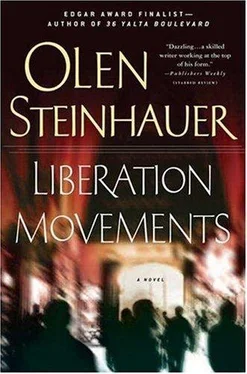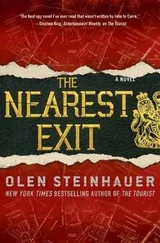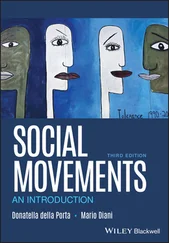Olen Steinhauer - Liberation movements
Здесь есть возможность читать онлайн «Olen Steinhauer - Liberation movements» весь текст электронной книги совершенно бесплатно (целиком полную версию без сокращений). В некоторых случаях можно слушать аудио, скачать через торрент в формате fb2 и присутствует краткое содержание. Жанр: Политический детектив, на английском языке. Описание произведения, (предисловие) а так же отзывы посетителей доступны на портале библиотеки ЛибКат.
- Название:Liberation movements
- Автор:
- Жанр:
- Год:неизвестен
- ISBN:нет данных
- Рейтинг книги:5 / 5. Голосов: 1
-
Избранное:Добавить в избранное
- Отзывы:
-
Ваша оценка:
- 100
- 1
- 2
- 3
- 4
- 5
Liberation movements: краткое содержание, описание и аннотация
Предлагаем к чтению аннотацию, описание, краткое содержание или предисловие (зависит от того, что написал сам автор книги «Liberation movements»). Если вы не нашли необходимую информацию о книге — напишите в комментариях, мы постараемся отыскать её.
Liberation movements — читать онлайн бесплатно полную книгу (весь текст) целиком
Ниже представлен текст книги, разбитый по страницам. Система сохранения места последней прочитанной страницы, позволяет с удобством читать онлайн бесплатно книгу «Liberation movements», без необходимости каждый раз заново искать на чём Вы остановились. Поставьте закладку, и сможете в любой момент перейти на страницу, на которой закончили чтение.
Интервал:
Закладка:
Then Mas hung up and walked out of the airport.
The morning sun was hotter than Gavra expected, beating down as he slipped on his sunglasses and followed Mas across the parking lot to where he got into a rented beige Mercedes. Gavra half-jogged to his Renault.
On the drive back into Istanbul, he convinced himself that Ludvik Mas was behind the hijacking. There was no reason to believe this, but he believed it just the same, and he was self-aware enough to know why. He was too attached to surfaces, always falling victim to that word Brano Sev enjoyed harping on-sentimentality. It is, Brano had told him numerous times, the demise of all good operatives, resulting in the most fatalities. But you’re young. You just don’t understand yet.
And that, as Gavra well knew, was true.
It had been true the previous winter, back in the Capital, when a young woman named Dora was discovered taking photographs of military documents at her office and delivering them to her lover, a West German with diplomatic papers. Gavra had been alone on that case-Brano was on one of his many Vienna trips-and had decided that she was, in the end, apolitical. She was simply in love, and thus capable of immense stupidity. So he didn’t bring her in. The next day, Dora flew to Bonn with her lover and was promoted to major in the West German secret police, the BND.
The Mercedes maintained an even clip, following signs to Beyo lu, yet sometimes Gavra had trouble keeping up. He swept around two car accidents, neither serious but both surrounded by small Turks shouting at one another and waving hands in the air.
Finally, after driving up Ataturk Bulvari and across Ataturk Bridge, spanning the Golden Horn, then rising toward the Galata Tower, Mas stopped at a surprising place: the splendorous cube of the Hotel Pera Palas, where he handed his car keys to a doorman and strolled inside. Gavra parked a little farther down the narrow street, then jogged back, narrowly avoiding an accident.
When he reached the ornate foyer, with Ottoman columns and a wall of coral marble, Mas was to the left, at the front desk, taking his key from a smiling clerk. Then he jogged up a few stairs and entered the century-old elevator.
For the next half hour, Gavra waited in the lounge with a copy of the International Herald Tribune, reading dismal editorials on Pol Pot’s recent proclamation of the “Democratic Republic of Kampuchea” in Cambodia before drifting to thoughts of Armenians.
Being at the top of his class in the Ministry academy, he had a strong grasp of history. He knew that, despite Turkish claims to the contrary, a series of forced movements took place in the early part of the century, coming to a head in 1915, when the ruling group known as the Young Turks took it upon themselves to rid their country of Armenian Christians while the Great War diverted the rest of the world’s attention. The expulsion was carried out so systematically that no one could reasonably deny that orders from above set it in motion.
The Turkish military was first purged of Armenian soldiers, often by group execution. Then cities and villages were taken over by newly purified Turkish troops, who killed Armenian men and forced the remaining women and children into overcrowded trains that spilled them into the desert, or sent them on death marches, where they died of starvation and disease under the summer sun. Reports from American and German officials at the time noted that the roads were lined and rivers choked with the rotting bodies of these ill-fated people. Later, according to a questionable American journalist, Adolf Hitler would tell his generals, Who, after all, speaks today of the annihilation of the Armenians?
Gavra believed most complex disputes to be hopeless, and this one was no exception.
Brano had often wondered aloud about his pupil’s innate pessimism when it came to international affairs. Then why are you working for the Ministry? If you don’t believe some sort of good can come from what we do, then why are you doing it?
Gavra had been recruited straight out of high school, by a man in his village he knew his father despised. He joined in order to make his father suffer for a childhood of humiliations. Even though it had begun in anger, over the years Gavra had found security in the shell of the Ministry that he nonetheless treated with suspicion. So why did he remain?
Not even he knew the answer.
He closed the newspaper and tried to recall Libarid Terzian. He didn’t know Libarid that well-only through his file and a few casual conversations-but for the last year they had sat at desks in the same room, and Gavra couldn’t help but mourn him in some way. Libarid and his late mother had been part of that stream of Armenian refugees fleeing the terror today’s hijackers had sought to revenge.
Ludvik Mas returned to the front desk carrying a small suitcase. He handed over his key, paid his bill, then walked past his shadow and through the front door.
On Ataturk Bulvari, passing another accident, he considered running Mas off the road. This man, who no doubt brought down a plane full of innocents, was probably going home. It was one thing in this world that Gavra could point at and, without hesitation, call wrong.
He sped up, halving the distance.
Once they reached the airport, he and Brano would have to go through the Turks in order to do anything, but here on the open road, Gavra could take care of Mas himself. It was an appealing option.
Like during other moments of decision, though, Gavra flustered as the old man’s orders came back to him: Do not make contact, only follow.
“Shit,” he muttered.
Gavra loosened his grip on the wheel and let Mas pull farther ahead. He turned on the radio for comfort, and half-listened to pop music with lilting Arabic tones as they left town again. He tapped his finger on the steering wheel, trying to whistle with the tune, but found that it was always slightly different than he expected; it was unpredictable.
When he thought he’d finally gotten the melody down, Mas took the exit for Ataturk International Airport.
Gavra switched off the radio.
Mas carried his suitcase inside. He returned his keys to a car rental desk, then went to the small TisAir desk in the departures area. He bought a ticket and smiled at the heavyset Turkish woman who sold it to him, then walked through the security check to the gates.
Gavra approached the TisAir desk with his most winning smile. “Excuse me. I know you’re going to think this is rude, but you have the most beautiful eyes I’ve ever seen.”
She blushed. “Well…well, thank you.”
“I bet this is an interesting job.”
She snorted. “I wish. ”
“People going all over the world, and you’re the one who puts them on the path. That’s not so bad.”
“But I stay here.”
“That may be true, but you meet the world through this desk. Like that man who just left. Where was he going?”
In the arrivals lounge, the earlier frustration had become misery. Women wept beside the mullein plant, and men shouted as if they’d just wrecked each other’s cars. A squealing mother gripped Gavra’s arm, but he shook her off, heading down the corridor to the door marked GUVENLIK. The guard nodded at him, but still refused to smile.
Brano was alone with the fat man. On a table, a reel-to-reel tape player sat inert as both men smoked. Brano said, “Anything on Mas?”
“He cleared out of his hotel room in the Pera Palas, and now he’s waiting for a flight back home.”
“He’s still in the airport?”
“Flight leaves in an hour.”
The fat man grunted and said in his heavy accent, “I can not make the sense of it.”
“Play it for him,” said Brano.
The fat man got up to leave. “You do it. I can not listen more.”
Читать дальшеИнтервал:
Закладка:
Похожие книги на «Liberation movements»
Представляем Вашему вниманию похожие книги на «Liberation movements» списком для выбора. Мы отобрали схожую по названию и смыслу литературу в надежде предоставить читателям больше вариантов отыскать новые, интересные, ещё непрочитанные произведения.
Обсуждение, отзывы о книге «Liberation movements» и просто собственные мнения читателей. Оставьте ваши комментарии, напишите, что Вы думаете о произведении, его смысле или главных героях. Укажите что конкретно понравилось, а что нет, и почему Вы так считаете.












